Psychology of Human Behavior: Examining if Brain Training is Effective
VerifiedAdded on 2023/06/11
|7
|2000
|63
Essay
AI Summary
This essay explores the effectiveness of brain training on cognitive skills and human performance. It examines various studies and research findings, presenting arguments for and against the notion that brain training leads to genuine cognitive improvement. The essay discusses studies involving adults undergoing brain training games, analyses by behavioral and neuroscience researchers, and experiments measuring cognitive function changes. It delves into theories like formal discipline and transfer by similar elements, highlighting the debate on whether brain training's benefits transfer to real-world cognitive skills. The analysis includes evidence suggesting that while brain training may improve performance on specific tasks, its impact on broader cognitive abilities and daily performance remains limited. The essay concludes by noting the shortcomings in many studies and emphasizing the need for rigorous research methodologies to accurately assess the effectiveness of brain training.
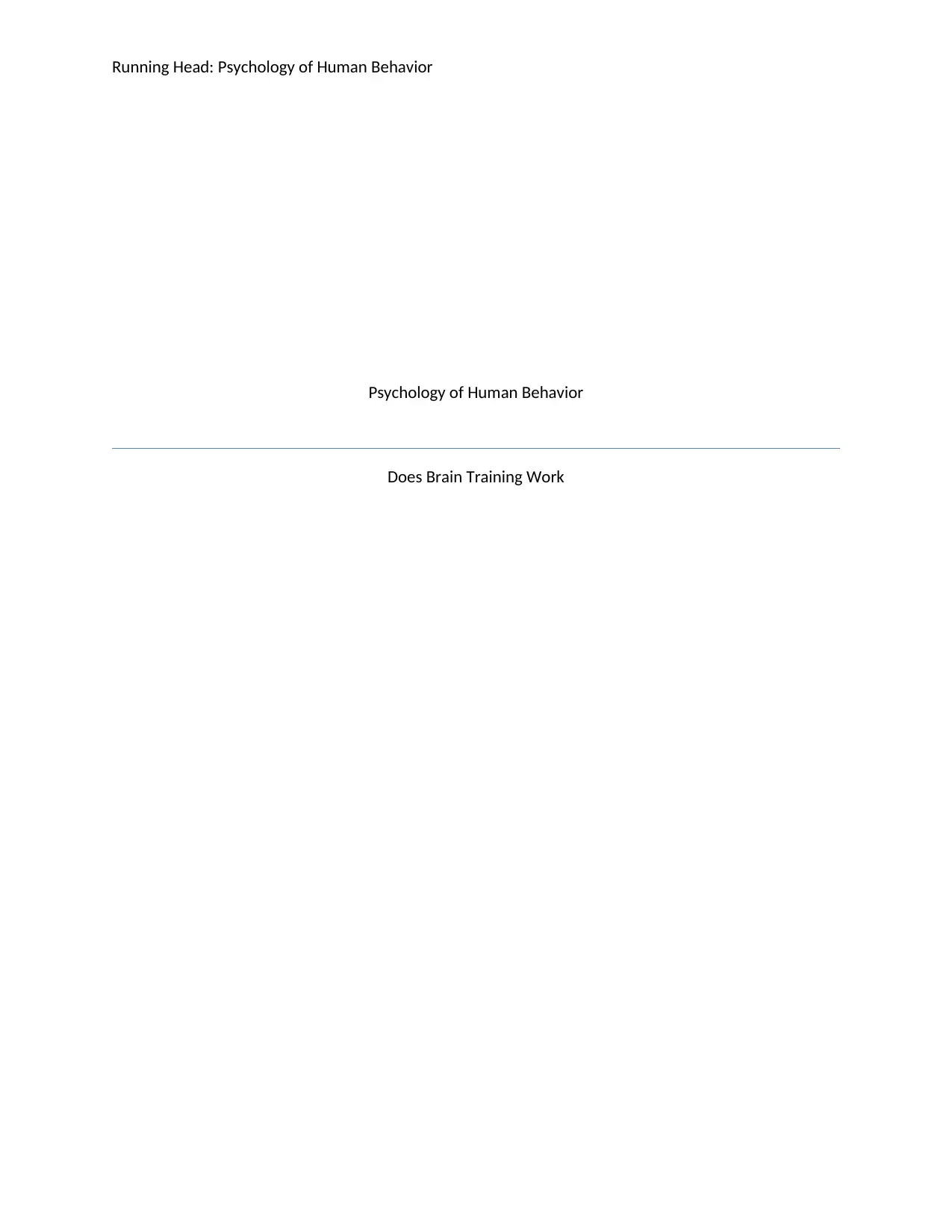
Running Head: Psychology of Human Behavior
Psychology of Human Behavior
Does Brain Training Work
Psychology of Human Behavior
Does Brain Training Work
Paraphrase This Document
Need a fresh take? Get an instant paraphrase of this document with our AI Paraphraser
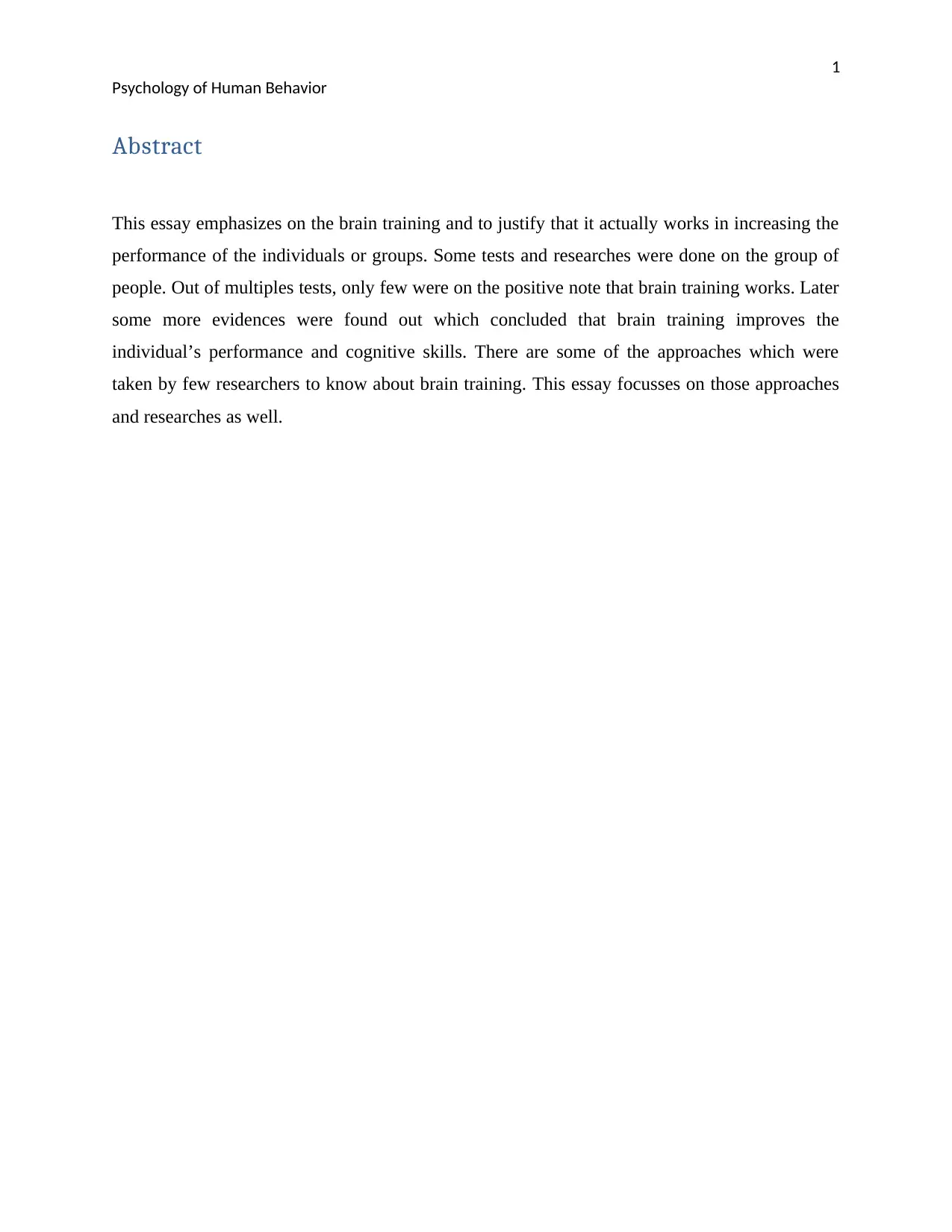
1
Psychology of Human Behavior
Abstract
This essay emphasizes on the brain training and to justify that it actually works in increasing the
performance of the individuals or groups. Some tests and researches were done on the group of
people. Out of multiples tests, only few were on the positive note that brain training works. Later
some more evidences were found out which concluded that brain training improves the
individual’s performance and cognitive skills. There are some of the approaches which were
taken by few researchers to know about brain training. This essay focusses on those approaches
and researches as well.
Psychology of Human Behavior
Abstract
This essay emphasizes on the brain training and to justify that it actually works in increasing the
performance of the individuals or groups. Some tests and researches were done on the group of
people. Out of multiples tests, only few were on the positive note that brain training works. Later
some more evidences were found out which concluded that brain training improves the
individual’s performance and cognitive skills. There are some of the approaches which were
taken by few researchers to know about brain training. This essay focusses on those approaches
and researches as well.
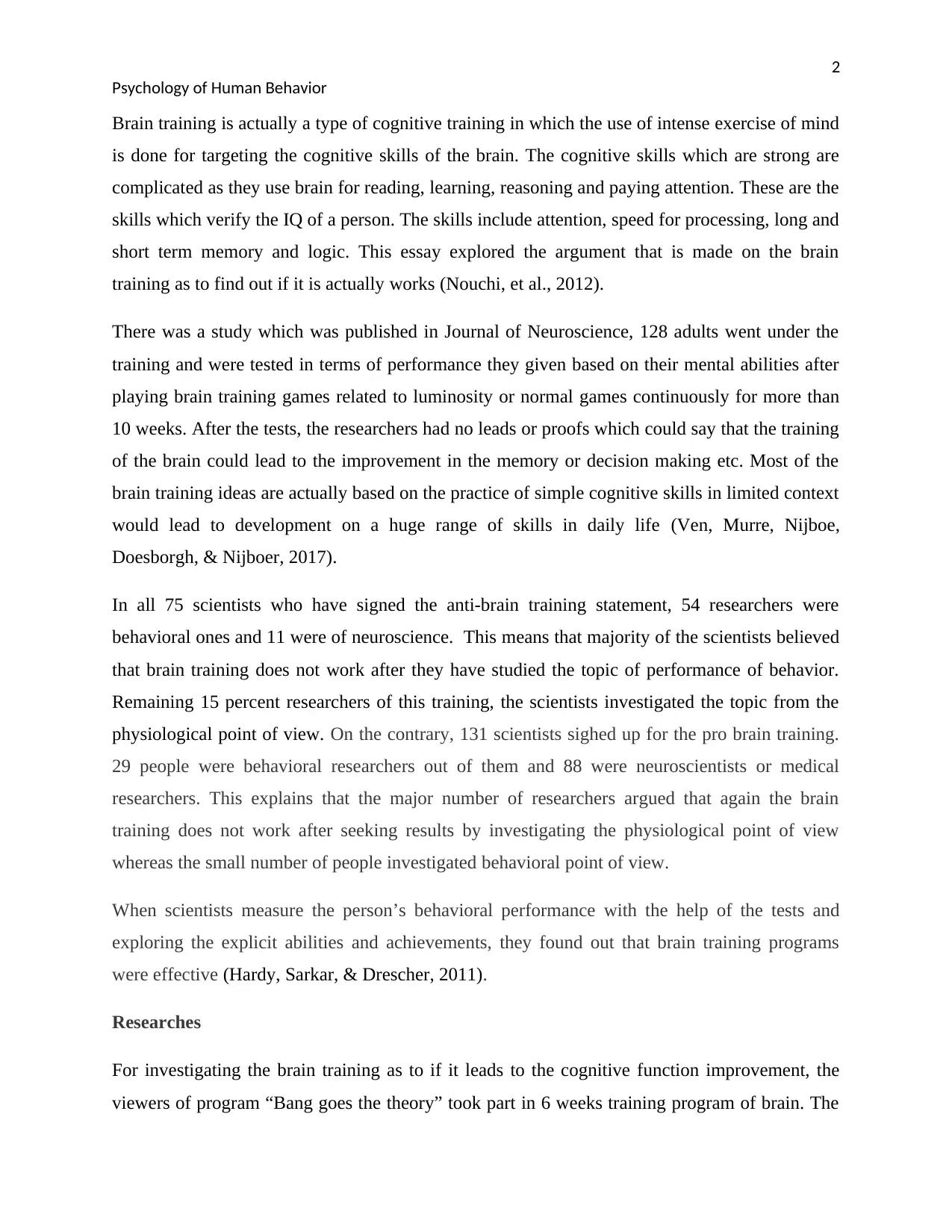
2
Psychology of Human Behavior
Brain training is actually a type of cognitive training in which the use of intense exercise of mind
is done for targeting the cognitive skills of the brain. The cognitive skills which are strong are
complicated as they use brain for reading, learning, reasoning and paying attention. These are the
skills which verify the IQ of a person. The skills include attention, speed for processing, long and
short term memory and logic. This essay explored the argument that is made on the brain
training as to find out if it is actually works (Nouchi, et al., 2012).
There was a study which was published in Journal of Neuroscience, 128 adults went under the
training and were tested in terms of performance they given based on their mental abilities after
playing brain training games related to luminosity or normal games continuously for more than
10 weeks. After the tests, the researchers had no leads or proofs which could say that the training
of the brain could lead to the improvement in the memory or decision making etc. Most of the
brain training ideas are actually based on the practice of simple cognitive skills in limited context
would lead to development on a huge range of skills in daily life (Ven, Murre, Nijboe,
Doesborgh, & Nijboer, 2017).
In all 75 scientists who have signed the anti-brain training statement, 54 researchers were
behavioral ones and 11 were of neuroscience. This means that majority of the scientists believed
that brain training does not work after they have studied the topic of performance of behavior.
Remaining 15 percent researchers of this training, the scientists investigated the topic from the
physiological point of view. On the contrary, 131 scientists sighed up for the pro brain training.
29 people were behavioral researchers out of them and 88 were neuroscientists or medical
researchers. This explains that the major number of researchers argued that again the brain
training does not work after seeking results by investigating the physiological point of view
whereas the small number of people investigated behavioral point of view.
When scientists measure the person’s behavioral performance with the help of the tests and
exploring the explicit abilities and achievements, they found out that brain training programs
were effective (Hardy, Sarkar, & Drescher, 2011).
Researches
For investigating the brain training as to if it leads to the cognitive function improvement, the
viewers of program “Bang goes the theory” took part in 6 weeks training program of brain. The
Psychology of Human Behavior
Brain training is actually a type of cognitive training in which the use of intense exercise of mind
is done for targeting the cognitive skills of the brain. The cognitive skills which are strong are
complicated as they use brain for reading, learning, reasoning and paying attention. These are the
skills which verify the IQ of a person. The skills include attention, speed for processing, long and
short term memory and logic. This essay explored the argument that is made on the brain
training as to find out if it is actually works (Nouchi, et al., 2012).
There was a study which was published in Journal of Neuroscience, 128 adults went under the
training and were tested in terms of performance they given based on their mental abilities after
playing brain training games related to luminosity or normal games continuously for more than
10 weeks. After the tests, the researchers had no leads or proofs which could say that the training
of the brain could lead to the improvement in the memory or decision making etc. Most of the
brain training ideas are actually based on the practice of simple cognitive skills in limited context
would lead to development on a huge range of skills in daily life (Ven, Murre, Nijboe,
Doesborgh, & Nijboer, 2017).
In all 75 scientists who have signed the anti-brain training statement, 54 researchers were
behavioral ones and 11 were of neuroscience. This means that majority of the scientists believed
that brain training does not work after they have studied the topic of performance of behavior.
Remaining 15 percent researchers of this training, the scientists investigated the topic from the
physiological point of view. On the contrary, 131 scientists sighed up for the pro brain training.
29 people were behavioral researchers out of them and 88 were neuroscientists or medical
researchers. This explains that the major number of researchers argued that again the brain
training does not work after seeking results by investigating the physiological point of view
whereas the small number of people investigated behavioral point of view.
When scientists measure the person’s behavioral performance with the help of the tests and
exploring the explicit abilities and achievements, they found out that brain training programs
were effective (Hardy, Sarkar, & Drescher, 2011).
Researches
For investigating the brain training as to if it leads to the cognitive function improvement, the
viewers of program “Bang goes the theory” took part in 6 weeks training program of brain. The
⊘ This is a preview!⊘
Do you want full access?
Subscribe today to unlock all pages.

Trusted by 1+ million students worldwide
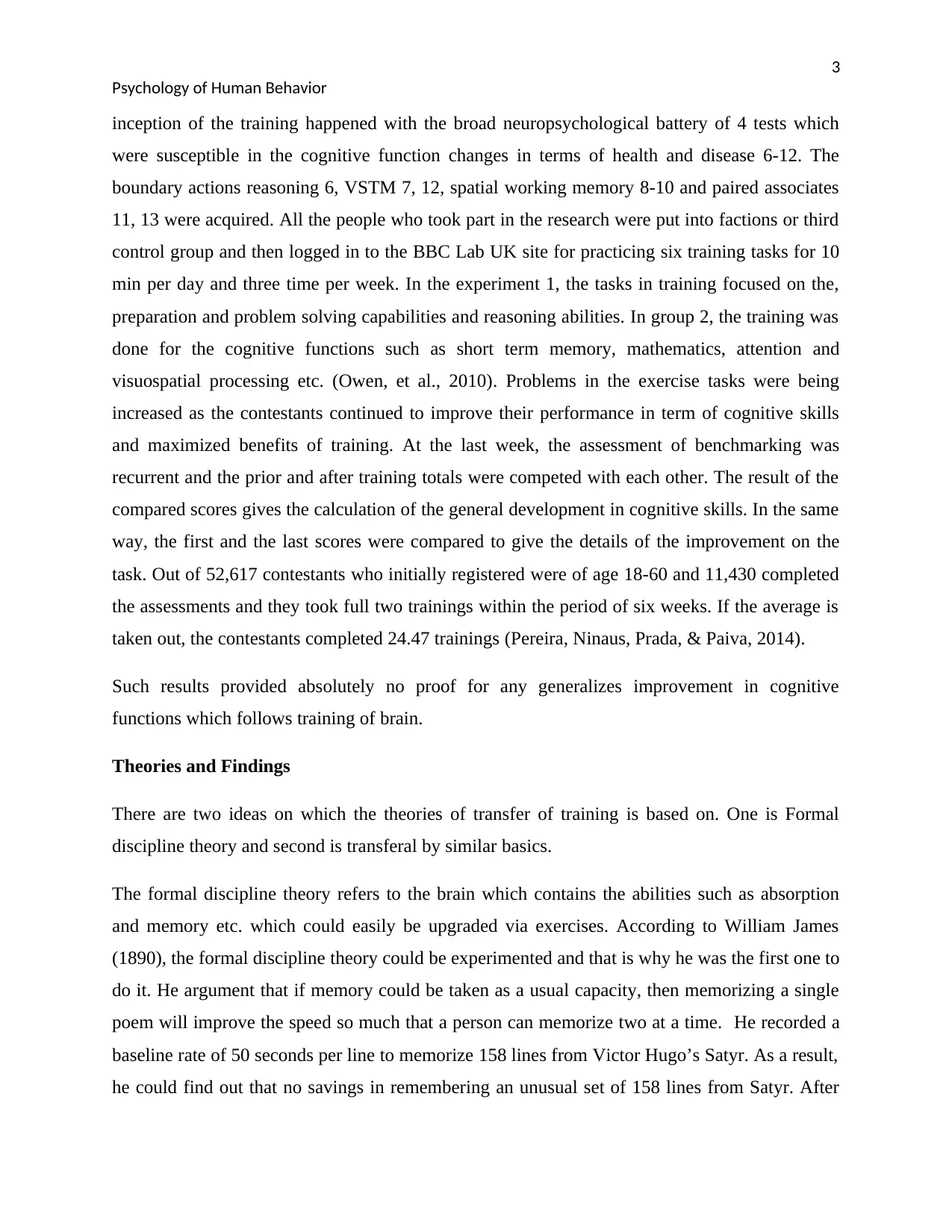
3
Psychology of Human Behavior
inception of the training happened with the broad neuropsychological battery of 4 tests which
were susceptible in the cognitive function changes in terms of health and disease 6-12. The
boundary actions reasoning 6, VSTM 7, 12, spatial working memory 8-10 and paired associates
11, 13 were acquired. All the people who took part in the research were put into factions or third
control group and then logged in to the BBC Lab UK site for practicing six training tasks for 10
min per day and three time per week. In the experiment 1, the tasks in training focused on the,
preparation and problem solving capabilities and reasoning abilities. In group 2, the training was
done for the cognitive functions such as short term memory, mathematics, attention and
visuospatial processing etc. (Owen, et al., 2010). Problems in the exercise tasks were being
increased as the contestants continued to improve their performance in term of cognitive skills
and maximized benefits of training. At the last week, the assessment of benchmarking was
recurrent and the prior and after training totals were competed with each other. The result of the
compared scores gives the calculation of the general development in cognitive skills. In the same
way, the first and the last scores were compared to give the details of the improvement on the
task. Out of 52,617 contestants who initially registered were of age 18-60 and 11,430 completed
the assessments and they took full two trainings within the period of six weeks. If the average is
taken out, the contestants completed 24.47 trainings (Pereira, Ninaus, Prada, & Paiva, 2014).
Such results provided absolutely no proof for any generalizes improvement in cognitive
functions which follows training of brain.
Theories and Findings
There are two ideas on which the theories of transfer of training is based on. One is Formal
discipline theory and second is transferal by similar basics.
The formal discipline theory refers to the brain which contains the abilities such as absorption
and memory etc. which could easily be upgraded via exercises. According to William James
(1890), the formal discipline theory could be experimented and that is why he was the first one to
do it. He argument that if memory could be taken as a usual capacity, then memorizing a single
poem will improve the speed so much that a person can memorize two at a time. He recorded a
baseline rate of 50 seconds per line to memorize 158 lines from Victor Hugo’s Satyr. As a result,
he could find out that no savings in remembering an unusual set of 158 lines from Satyr. After
Psychology of Human Behavior
inception of the training happened with the broad neuropsychological battery of 4 tests which
were susceptible in the cognitive function changes in terms of health and disease 6-12. The
boundary actions reasoning 6, VSTM 7, 12, spatial working memory 8-10 and paired associates
11, 13 were acquired. All the people who took part in the research were put into factions or third
control group and then logged in to the BBC Lab UK site for practicing six training tasks for 10
min per day and three time per week. In the experiment 1, the tasks in training focused on the,
preparation and problem solving capabilities and reasoning abilities. In group 2, the training was
done for the cognitive functions such as short term memory, mathematics, attention and
visuospatial processing etc. (Owen, et al., 2010). Problems in the exercise tasks were being
increased as the contestants continued to improve their performance in term of cognitive skills
and maximized benefits of training. At the last week, the assessment of benchmarking was
recurrent and the prior and after training totals were competed with each other. The result of the
compared scores gives the calculation of the general development in cognitive skills. In the same
way, the first and the last scores were compared to give the details of the improvement on the
task. Out of 52,617 contestants who initially registered were of age 18-60 and 11,430 completed
the assessments and they took full two trainings within the period of six weeks. If the average is
taken out, the contestants completed 24.47 trainings (Pereira, Ninaus, Prada, & Paiva, 2014).
Such results provided absolutely no proof for any generalizes improvement in cognitive
functions which follows training of brain.
Theories and Findings
There are two ideas on which the theories of transfer of training is based on. One is Formal
discipline theory and second is transferal by similar basics.
The formal discipline theory refers to the brain which contains the abilities such as absorption
and memory etc. which could easily be upgraded via exercises. According to William James
(1890), the formal discipline theory could be experimented and that is why he was the first one to
do it. He argument that if memory could be taken as a usual capacity, then memorizing a single
poem will improve the speed so much that a person can memorize two at a time. He recorded a
baseline rate of 50 seconds per line to memorize 158 lines from Victor Hugo’s Satyr. As a result,
he could find out that no savings in remembering an unusual set of 158 lines from Satyr. After
Paraphrase This Document
Need a fresh take? Get an instant paraphrase of this document with our AI Paraphraser
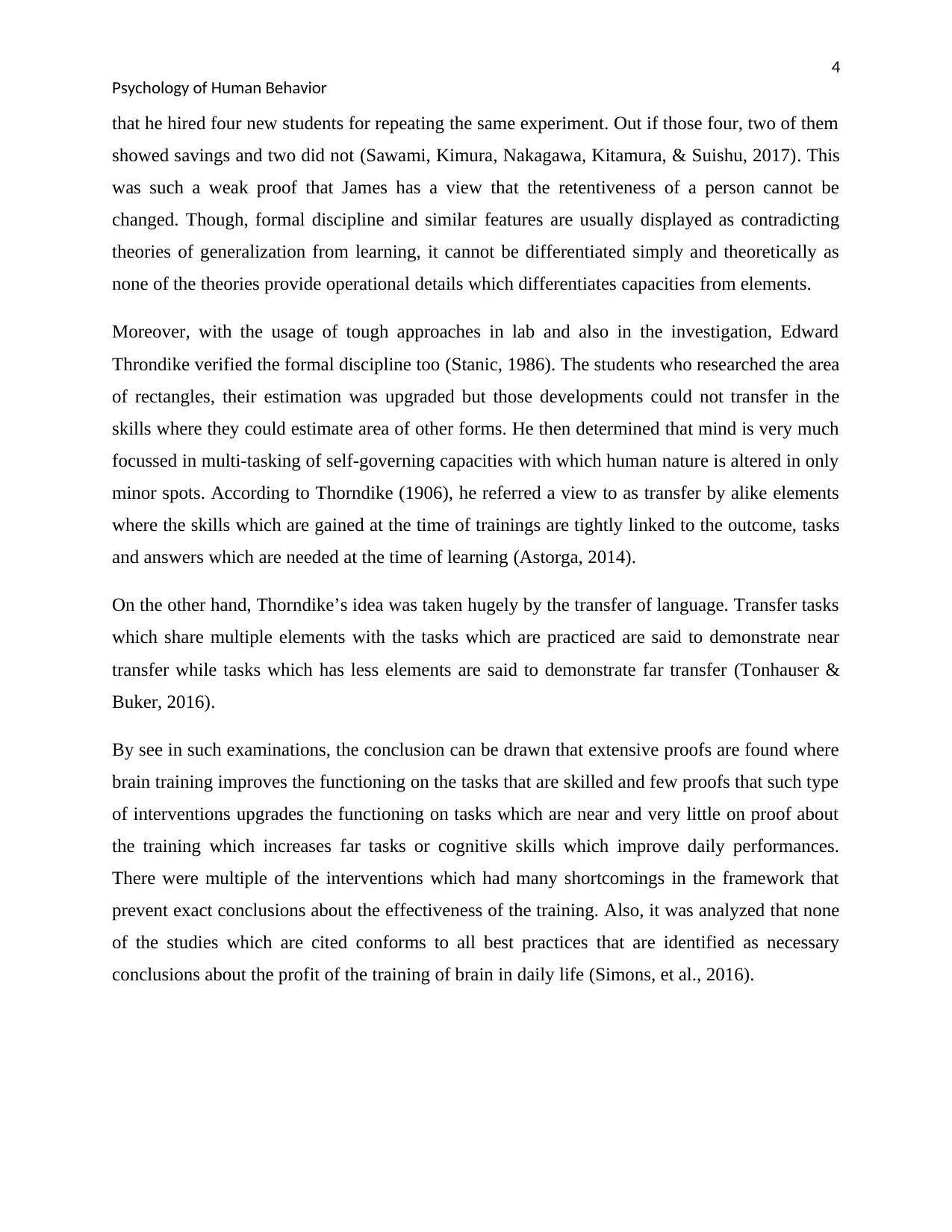
4
Psychology of Human Behavior
that he hired four new students for repeating the same experiment. Out if those four, two of them
showed savings and two did not (Sawami, Kimura, Nakagawa, Kitamura, & Suishu, 2017). This
was such a weak proof that James has a view that the retentiveness of a person cannot be
changed. Though, formal discipline and similar features are usually displayed as contradicting
theories of generalization from learning, it cannot be differentiated simply and theoretically as
none of the theories provide operational details which differentiates capacities from elements.
Moreover, with the usage of tough approaches in lab and also in the investigation, Edward
Throndike verified the formal discipline too (Stanic, 1986). The students who researched the area
of rectangles, their estimation was upgraded but those developments could not transfer in the
skills where they could estimate area of other forms. He then determined that mind is very much
focussed in multi-tasking of self-governing capacities with which human nature is altered in only
minor spots. According to Thorndike (1906), he referred a view to as transfer by alike elements
where the skills which are gained at the time of trainings are tightly linked to the outcome, tasks
and answers which are needed at the time of learning (Astorga, 2014).
On the other hand, Thorndike’s idea was taken hugely by the transfer of language. Transfer tasks
which share multiple elements with the tasks which are practiced are said to demonstrate near
transfer while tasks which has less elements are said to demonstrate far transfer (Tonhauser &
Buker, 2016).
By see in such examinations, the conclusion can be drawn that extensive proofs are found where
brain training improves the functioning on the tasks that are skilled and few proofs that such type
of interventions upgrades the functioning on tasks which are near and very little on proof about
the training which increases far tasks or cognitive skills which improve daily performances.
There were multiple of the interventions which had many shortcomings in the framework that
prevent exact conclusions about the effectiveness of the training. Also, it was analyzed that none
of the studies which are cited conforms to all best practices that are identified as necessary
conclusions about the profit of the training of brain in daily life (Simons, et al., 2016).
Psychology of Human Behavior
that he hired four new students for repeating the same experiment. Out if those four, two of them
showed savings and two did not (Sawami, Kimura, Nakagawa, Kitamura, & Suishu, 2017). This
was such a weak proof that James has a view that the retentiveness of a person cannot be
changed. Though, formal discipline and similar features are usually displayed as contradicting
theories of generalization from learning, it cannot be differentiated simply and theoretically as
none of the theories provide operational details which differentiates capacities from elements.
Moreover, with the usage of tough approaches in lab and also in the investigation, Edward
Throndike verified the formal discipline too (Stanic, 1986). The students who researched the area
of rectangles, their estimation was upgraded but those developments could not transfer in the
skills where they could estimate area of other forms. He then determined that mind is very much
focussed in multi-tasking of self-governing capacities with which human nature is altered in only
minor spots. According to Thorndike (1906), he referred a view to as transfer by alike elements
where the skills which are gained at the time of trainings are tightly linked to the outcome, tasks
and answers which are needed at the time of learning (Astorga, 2014).
On the other hand, Thorndike’s idea was taken hugely by the transfer of language. Transfer tasks
which share multiple elements with the tasks which are practiced are said to demonstrate near
transfer while tasks which has less elements are said to demonstrate far transfer (Tonhauser &
Buker, 2016).
By see in such examinations, the conclusion can be drawn that extensive proofs are found where
brain training improves the functioning on the tasks that are skilled and few proofs that such type
of interventions upgrades the functioning on tasks which are near and very little on proof about
the training which increases far tasks or cognitive skills which improve daily performances.
There were multiple of the interventions which had many shortcomings in the framework that
prevent exact conclusions about the effectiveness of the training. Also, it was analyzed that none
of the studies which are cited conforms to all best practices that are identified as necessary
conclusions about the profit of the training of brain in daily life (Simons, et al., 2016).
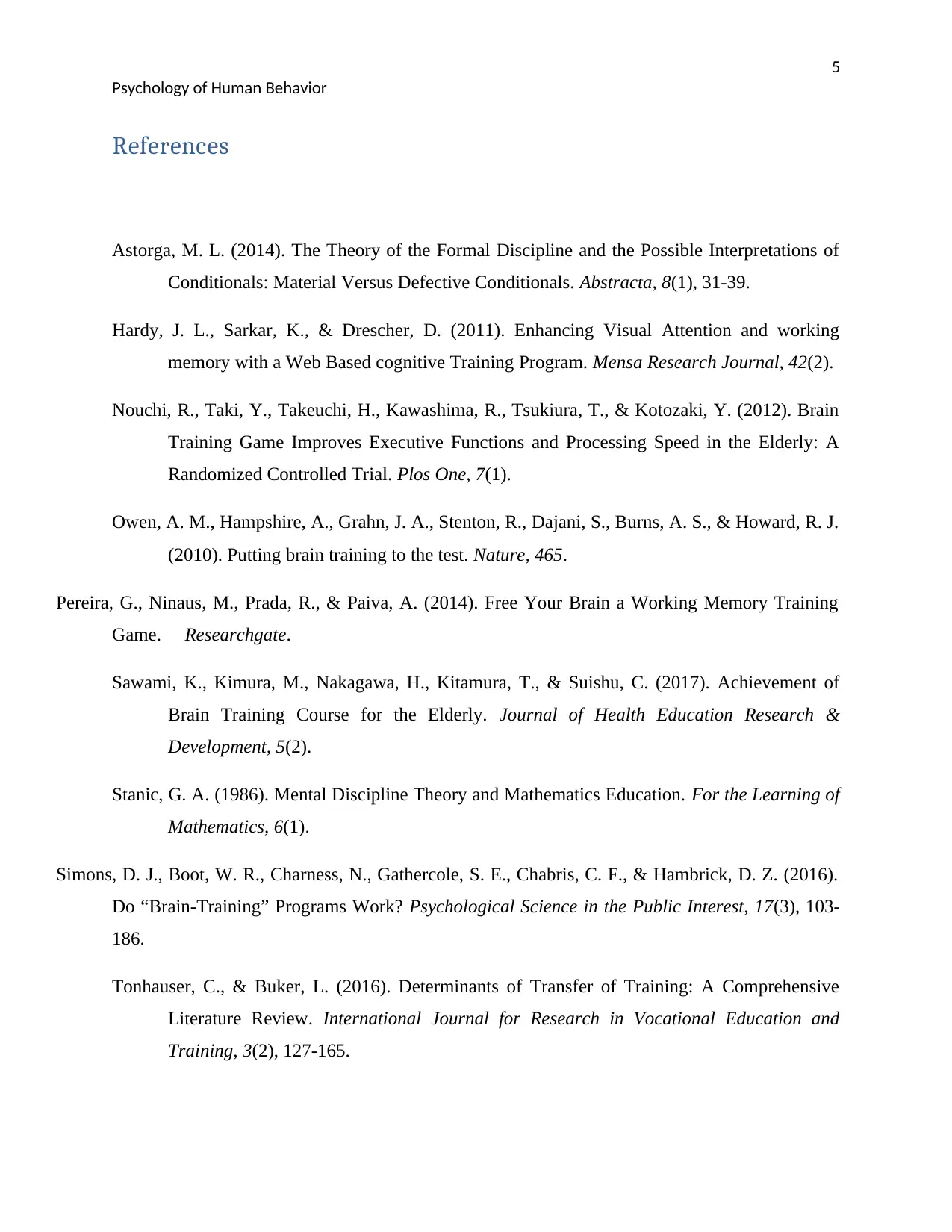
5
Psychology of Human Behavior
References
Astorga, M. L. (2014). The Theory of the Formal Discipline and the Possible Interpretations of
Conditionals: Material Versus Defective Conditionals. Abstracta, 8(1), 31-39.
Hardy, J. L., Sarkar, K., & Drescher, D. (2011). Enhancing Visual Attention and working
memory with a Web Based cognitive Training Program. Mensa Research Journal, 42(2).
Nouchi, R., Taki, Y., Takeuchi, H., Kawashima, R., Tsukiura, T., & Kotozaki, Y. (2012). Brain
Training Game Improves Executive Functions and Processing Speed in the Elderly: A
Randomized Controlled Trial. Plos One, 7(1).
Owen, A. M., Hampshire, A., Grahn, J. A., Stenton, R., Dajani, S., Burns, A. S., & Howard, R. J.
(2010). Putting brain training to the test. Nature, 465.
Pereira, G., Ninaus, M., Prada, R., & Paiva, A. (2014). Free Your Brain a Working Memory Training
Game. Researchgate.
Sawami, K., Kimura, M., Nakagawa, H., Kitamura, T., & Suishu, C. (2017). Achievement of
Brain Training Course for the Elderly. Journal of Health Education Research &
Development, 5(2).
Stanic, G. A. (1986). Mental Discipline Theory and Mathematics Education. For the Learning of
Mathematics, 6(1).
Simons, D. J., Boot, W. R., Charness, N., Gathercole, S. E., Chabris, C. F., & Hambrick, D. Z. (2016).
Do “Brain-Training” Programs Work? Psychological Science in the Public Interest, 17(3), 103-
186.
Tonhauser, C., & Buker, L. (2016). Determinants of Transfer of Training: A Comprehensive
Literature Review. International Journal for Research in Vocational Education and
Training, 3(2), 127-165.
Psychology of Human Behavior
References
Astorga, M. L. (2014). The Theory of the Formal Discipline and the Possible Interpretations of
Conditionals: Material Versus Defective Conditionals. Abstracta, 8(1), 31-39.
Hardy, J. L., Sarkar, K., & Drescher, D. (2011). Enhancing Visual Attention and working
memory with a Web Based cognitive Training Program. Mensa Research Journal, 42(2).
Nouchi, R., Taki, Y., Takeuchi, H., Kawashima, R., Tsukiura, T., & Kotozaki, Y. (2012). Brain
Training Game Improves Executive Functions and Processing Speed in the Elderly: A
Randomized Controlled Trial. Plos One, 7(1).
Owen, A. M., Hampshire, A., Grahn, J. A., Stenton, R., Dajani, S., Burns, A. S., & Howard, R. J.
(2010). Putting brain training to the test. Nature, 465.
Pereira, G., Ninaus, M., Prada, R., & Paiva, A. (2014). Free Your Brain a Working Memory Training
Game. Researchgate.
Sawami, K., Kimura, M., Nakagawa, H., Kitamura, T., & Suishu, C. (2017). Achievement of
Brain Training Course for the Elderly. Journal of Health Education Research &
Development, 5(2).
Stanic, G. A. (1986). Mental Discipline Theory and Mathematics Education. For the Learning of
Mathematics, 6(1).
Simons, D. J., Boot, W. R., Charness, N., Gathercole, S. E., Chabris, C. F., & Hambrick, D. Z. (2016).
Do “Brain-Training” Programs Work? Psychological Science in the Public Interest, 17(3), 103-
186.
Tonhauser, C., & Buker, L. (2016). Determinants of Transfer of Training: A Comprehensive
Literature Review. International Journal for Research in Vocational Education and
Training, 3(2), 127-165.
⊘ This is a preview!⊘
Do you want full access?
Subscribe today to unlock all pages.

Trusted by 1+ million students worldwide
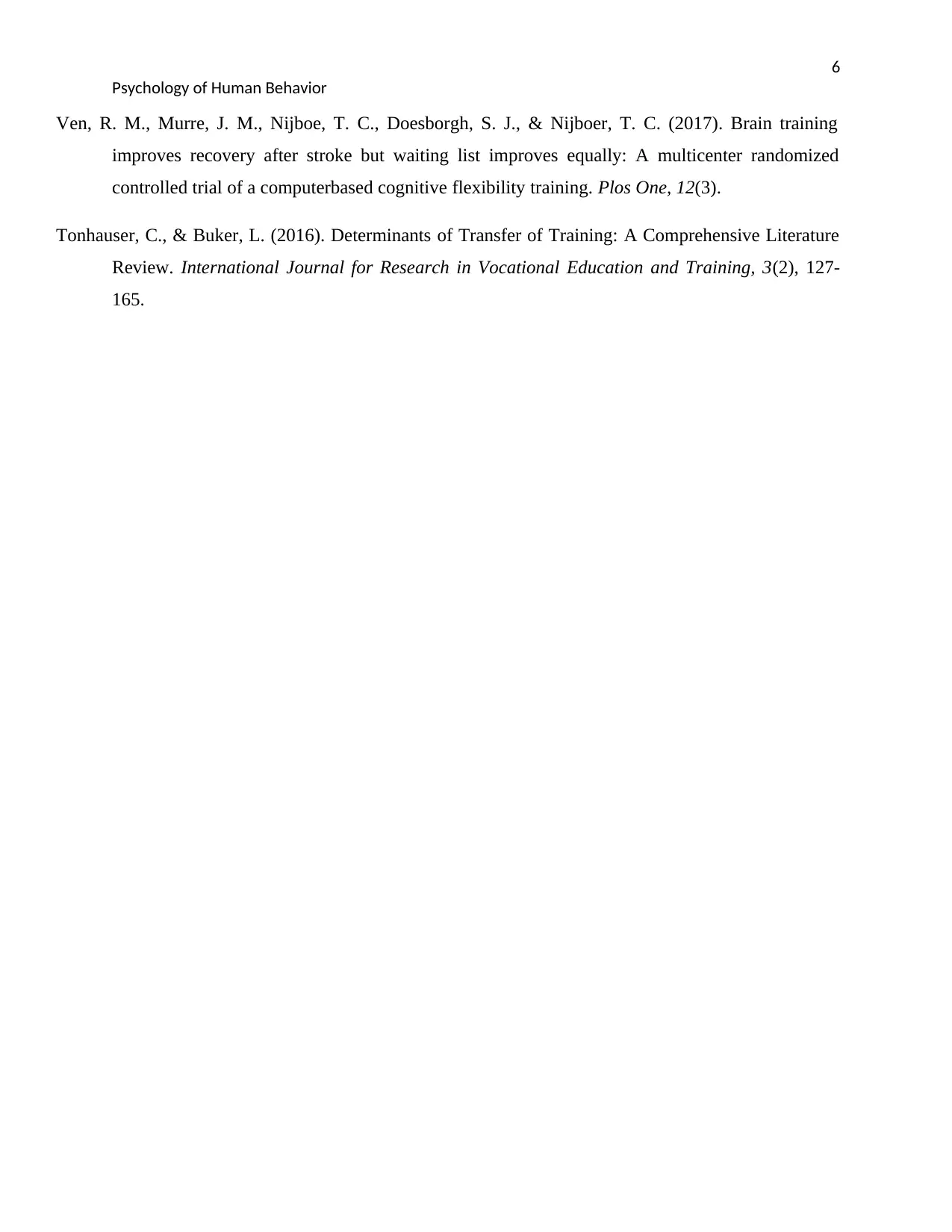
6
Psychology of Human Behavior
Ven, R. M., Murre, J. M., Nijboe, T. C., Doesborgh, S. J., & Nijboer, T. C. (2017). Brain training
improves recovery after stroke but waiting list improves equally: A multicenter randomized
controlled trial of a computerbased cognitive flexibility training. Plos One, 12(3).
Tonhauser, C., & Buker, L. (2016). Determinants of Transfer of Training: A Comprehensive Literature
Review. International Journal for Research in Vocational Education and Training, 3(2), 127-
165.
Psychology of Human Behavior
Ven, R. M., Murre, J. M., Nijboe, T. C., Doesborgh, S. J., & Nijboer, T. C. (2017). Brain training
improves recovery after stroke but waiting list improves equally: A multicenter randomized
controlled trial of a computerbased cognitive flexibility training. Plos One, 12(3).
Tonhauser, C., & Buker, L. (2016). Determinants of Transfer of Training: A Comprehensive Literature
Review. International Journal for Research in Vocational Education and Training, 3(2), 127-
165.
1 out of 7
Related Documents
Your All-in-One AI-Powered Toolkit for Academic Success.
+13062052269
info@desklib.com
Available 24*7 on WhatsApp / Email
![[object Object]](/_next/static/media/star-bottom.7253800d.svg)
Unlock your academic potential
Copyright © 2020–2025 A2Z Services. All Rights Reserved. Developed and managed by ZUCOL.





